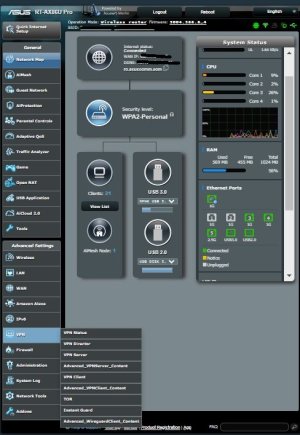On 750Mbps fiber connection my PC download speed is about 650Mbps using WireGuard NT, which is the official kernel space WireGuard client for Windows, or OpenVPN with Data Channel Offload, which also runs in kernel space. Enabling WireGuard VPN Fusion on ASUS RT-AX86U Pro (stock 3.0.0.6 firmware) for any VLAN results in my main PC download speed being reduced to about 450Mbps regardless of whether I use WireGuard NT or OpenVPN-DCO. That happens even if nobody is connected to the router except for my main PC. Is that normal?
If I route my PC through ASUS router's WireGuard tunnel (instead of using WireGuard for Windows), then I get about 500Mbps for download speed, but OpenVPN bandwidth maxes out at 200Mbps. My guess is that official stock firmware does not use DCO for OpenVPN.
Running bandwidth tests does show that router's CPU Core 1 reaches 100% utilization. Other 3 cores stat at 1% during those tests. Is this router simply not optimized to run WireGuard in kernel space?
EDIT: It looks like its some kind of port saturation issue. If I use OpenVPN-DCO via non-default port 51820 (same as default WireGuard port) then my PC bandwidth is reduced to 450Mbps when WireGuard is enabled for any client on this router, but if I switch my PC to use OpenVPN-DCO via port 1194, then my bandwidth goes back up to 650Mbps, even when WireGuard is enabled on router for other clients. Why would outbound port affect bandwidth?
If I route my PC through ASUS router's WireGuard tunnel (instead of using WireGuard for Windows), then I get about 500Mbps for download speed, but OpenVPN bandwidth maxes out at 200Mbps. My guess is that official stock firmware does not use DCO for OpenVPN.
Running bandwidth tests does show that router's CPU Core 1 reaches 100% utilization. Other 3 cores stat at 1% during those tests. Is this router simply not optimized to run WireGuard in kernel space?
EDIT: It looks like its some kind of port saturation issue. If I use OpenVPN-DCO via non-default port 51820 (same as default WireGuard port) then my PC bandwidth is reduced to 450Mbps when WireGuard is enabled for any client on this router, but if I switch my PC to use OpenVPN-DCO via port 1194, then my bandwidth goes back up to 650Mbps, even when WireGuard is enabled on router for other clients. Why would outbound port affect bandwidth?
Last edited:


